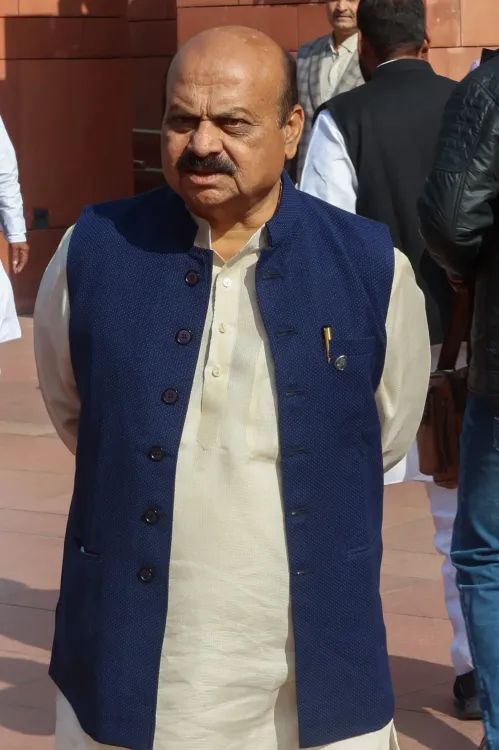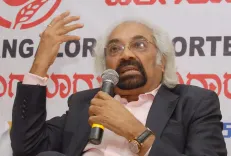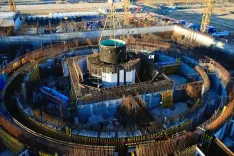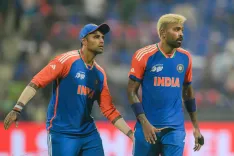Does the Backward Class Commission Have Authority for Community Enumeration?

Synopsis
Key Takeaways
- Backward Class Commission lacks authority for community enumeration.
- Karnataka's caste census aims to survey 1.5 crore households in 15 days.
- Legal concerns arise from the Census Act regarding door-to-door surveys.
- Political implications of caste enumeration are significant.
- Community unity is essential amidst rising divisions.
Bengaluru, Sep 16 (NationPress) Former Chief Minister and BJP MP Basavaraj Bommai asserted on Tuesday that the Backward Class Commission, assigned with the responsibility of executing a door-to-door Socio-Economic and Academic Survey throughout Karnataka, lacks the authority to enumerate all communities.
Addressing the media in Bengaluru after a gathering of prominent leaders, Bommai stated, "The Centre has already announced it will conduct a nationwide caste census. The caste census initiated by the Karnataka government is merely deceiving the populace. They aim to survey 1.5 crore households in just 15 days, with each household facing 60 questions. How can this be accomplished in such a short time? It is an unattainable objective."
"The state government has tasked the Backward Class Commission with carrying out the caste survey. However, the Commission's mandate is limited to enumerating backward classes; it does not encompass all communities within the state," Bommai emphasized.
"There is a misuse of authority, and the state government is misleading its citizens. Chief Minister Siddaramaiah, with his socialist roots, should acknowledge and correct these errors," he urged.
"According to the Census Act, the law regarding the Census explicitly states that the state government has no jurisdiction to conduct door-to-door surveys. Instead, they should obtain samples for the Socio-Economic and Academic Survey. However, the state government has opted for a door-to-door approach, which contravenes the law and the Census Act," he remarked.
Additionally, he criticized the inclusion of numerous castes, claiming it was an attempt to create confusion for political gain. Bommai questioned the rationale behind the formation of the Kantaraj Committee and the subsequent public disclosure of its report. He highlighted that the Chief Minister has failed to explain why the caste census report was dismissed.
"Chief Minister Siddaramaiah established sub-committees to address the previous caste census report, only to later convene a special Cabinet meeting announcing the rejection of the Kantaraj Committee's findings. Why was it disregarded, and what shortcomings were identified? Have these issues been rectified in the new caste census? Is this compliant with the law?" Bommai queried.
"Within the religion section, categories such as 'Others' and 'Atheists' are being introduced. What is the purpose of this confusion? Atheists lack a religion, so why are they included in the religious category?" he questioned.
Bommai continued, "Concerning conversions, the state government is categorizing Brahmin, Lingayat, Vokkaliga, SC, and ST Christians. What is the reason for this confusion? Individuals who convert identify as Christians, and many have returned to Hinduism. What offense have they committed?"
"Who devised these categories? Which law mandates a separate column for converted Christians? Under which constitutional provision is this specified? They frequently reference the Constitution yet make decisions contrary to it," he added.
"We will denounce this. Various religious leaders have already pointed out the flaws in the caste census, and these need to be addressed," he insisted.
"Since 2014, attempts have been made to divide the Veerashaiva-Lingayat community. The community has become aware and will not succumb to this conspiracy. In the 2018 state elections, CM Siddaramaiah faced defeat as a consequence. Now, he is trying once again," he remarked.
"Instead of fostering unity within the community and effectively governing the state, they are striving to fragment society and exert control through division. This will be rejected by the populace," he asserted.
"All communities in the state must prioritize unity. There is even a category for Kuruba Christians. Soon, a Kuruba Christian mutt will be established, and CM Siddaramaiah may be appointed as its pontiff. In what direction is society being led?" he ridiculed.
Union Minister for Jal Shakti and Railways V. Somanna announced, "Tomorrow (September 17), we will commemorate the birthday of our beloved Prime Minister Narendra Modi nationwide."
Speaking to the press today, Somanna shared, "I extend birthday wishes to this esteemed leader, who has been pivotal in the nation’s growth and a visionary recognized by the country."
He mentioned that a significant leaders' meeting took place in Bengaluru.
"Although Chief Minister Siddaramaiah possesses extensive knowledge of the Veerashaiva religion's history, he has engaged in schemes to dominate the community," he asserted, adding, "An in-depth discussion has been conducted regarding this issue."








